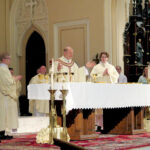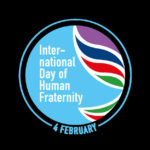Iowa’s bishops have released their new “Faithful Citizenship,” which reminds us of our right and duty to vote. The letter appears in this week’s paper. How we vote is up to each of us based on an informed conscience that requires study of the candidates and the issues they espouse. Equally important, though, is our responsibility to educate the candidates for local, county, state and federal office about issues that impact human flourishing, which forms the bedrock of Catholic teaching.
Nuns on the Bus, a lobbying movement on wheels, aims to do that in its latest tour across the U.S. The nuns believe that American workers have been hurt by the 2017 tax bill and efforts to repeal the Affordable Care Act. The nuns will also hold legislators accountable for their support of these measures during the tour that starts Oct. 8 in California. Led by Sister Simone Campbell, SSS, Nuns on the Bus demonstrates how grassroots action at the height of the election cycle builds awareness of the impact that legislation has on the lives of Americans struggling to make ends meet. Sr. Campbell, by the way, received the Pacem in Terris Peace and Freedom Award in Davenport during the Nuns on the Bus campaign in 2014.
The nuns are out to change hearts. They tell all who will listen — legislators, the media and the public — the stories of real people they meet on the road. This is an example of encounter that Pope Francis encourages all of us to experience. When we serve in soup kitchens, volunteer in housing projects, a classroom or a pro-life center, visit a nursing home or give someone a ride to a doctor’s appointment, we build on our understanding of what it takes to foster human flourishing.
We ought to do this, along with prayer and reading up on current events, to educate candidates about issues that affect the common good. In a nutshell, the common good refers to those things that are vital to human flourishing: food, shelter, clothing, health care, education, productive work, fair wages and protection from harm.
In a blog she wrote following the 2016 Nuns on the Bus tour, Sister Jan Cebula, who is now president of the Sisters of St. Francis of Clinton, spoke about the importance of making connections and building community. “… Making the connection between charitable activities, government policies and systems is key to making necessary changes. And as we learned about the efforts of people in each city, we saw the value they placed in forming coalitions.”
She reminds us that “Democracy is not a spectator sport.” The same can be said of Christianity. Christ instructed his followers to be among the people, reaching out to those in need. We are called to be the voice for the voiceless. In this election cycle we become that voice when we attend political rallies, write letters to the editor; visit, write or call our legislators’ offices to share our thoughts and advocate for change that fosters human flourishing.
Here are some suggestions:
Bread for the World has launched a “Vote to End Hunger Campaign.” Visit the website for details (https://tinyurl.com/ydy82zv2).
In preparation for the next legislative session, the Iowa Department of Aging, AARP Iowa and the Older Iowans Legislature seek input from Iowans on the biggest challenges when it comes to aging in Iowa. Go to: www.iowaaging.gov.
Visit the Iowa Catholic Conference website at www.iowacatholicconference.org to research a variety of issues and to learn about “Action Alerts” regarding legislation at the state and federal level.
“We each need to do our part to re-weave the fabric of society, to make our democracy strong. It’s not going to come from the top down; it will have to come from us,” Sr. Cebula said in her 2016 blog. That message remains relevant today.
Barb Arland-Fye, Editor,
(arland-fye@davenportdiocese.org)











